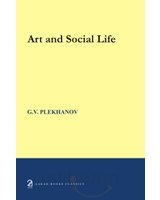Art and Social Life – G.V. Plekhanov
₹425.00
1 in stock
Description
The writings translated in this volume are an outstanding contribution to aesthetics.
The first of the three works, Letters without address, deals with the origins of art. Plekhanov shows how the paintings, songs and dances of primitive peoples, as well as the ornaments with which they adorned their bodies, arose from their communal system of production. Aesthetic standards are conditioned by economic activity.
In class-divided society, art reflects the social position and interests of different classes. Plekhanov’s essay on ‘French Dramatic art and French Eighteenth Century Painting’ is a masterful study of French drama and painting in the period leading up to and including the Great Revolution. He traces the rise and fall of aristocratic ‘classicism’ tradition in art, giving it an entirely new, revolutionary content. Full of interest are the passages dealing with the attack on Boucher’s school of painting by the Encyclopaedists headed by Denis Diderot, and then with the artistic views of the sans-culottes during the revolutionary dictatorship.
The subject of the last essay in this volume, ‘Art and Social Life’, is ‘art for art’s sake’. Here will be found a brilliant analysis of the views of the 19th-century ‘Romantics’. Plekhanov shows that ‘art for art’s sake’ arises when there exits ‘a hopeless disaccord’ between the artist and society, while the opposite conception of political, moral or utilitarian art is favoured both by reactionaries and revolutionaries, being given by each a completely different content.
The concluding section of this essay deals with ‘formalism’ in painting and poetry. It remains intensely contemporary, so little have the ‘formalism’ tendencies progressed in the forty years since it was written.
Additional information
| Weight | 0.49 kg |
|---|






